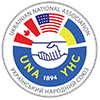The editorial below was published in the February 20, 1994, issue of The Ukrainian Weekly, which was dedicated to the centennial of the Ukrainian National Association.
One hundred years ago, 10 brotherhoods, having assets totaling $220 and a total membership of 439, resolved to form the Ukrainian National Association (then known as the Ruskyi Narodnyi Soyuz). They acted on the suggestion of a historic editorial that appeared in Svoboda on November 1, 1893: “Ukrainians scattered across this land need a national organization, namely such a brotherhood, such a national union that would embrace each and every Ukrainian no matter where he lives. …in unity there is strength, and it is not easily defeated….”
On February 22, 1894, the word became deed. The Ruthenian National Association was established, “it has come to be,” proclaimed Svoboda. The newspaper editorialized: “Dear brothers, now that a great number of us have gotten together and founded the association, let us all join it. … You, who had been given up for lost by your brothers in Ukraine, let the world know that you are alive, and that here, in America, the life of the Ukrainian community is throbbing with vigor and activity. …The Ukrainian National Association has been founded, and the Ukrainian people in America have risen from the dead…”
And so it was, the Ukrainian community in North America grew and prospered, as did the Ukrainian National Association. Today, at 100 years of age, it has assets of $72.5 million and a membership of 64,000. it has grown far, far beyond what it was at the time of its founding. But one thing has remained constant: its devotion to its founding principles. Throughout its history, the UNA has always extended a helping hand to its members, the Ukrainian community in the United States and Canada, Ukrainians wherever they have settled, and to Ukraine.
The UNA has supported countless community causes, from the erection of a monument to Taras Shevchenko in Washington and the creation of the World Congress of Free Ukrainians to the establishment of Ukrainian studies chairs and the Ukrainian Research institute at Harvard University, it has published numerous books, from Mykhailo Hrushevsky’s “History of Ukraine” to Robert Conquest’s “The Harvest of Sorrow.” It was a major donor to the work of the U.S. Commission on the Ukraine Famine as well as to the Harvard Project on the Millennium of Christianity in Ukraine.
Not to be forgotten are the UNA’s illustrious endeavors in the field of publishing (two newspapers, Svoboda and The Ukrainian Weekly, as well as the Veselka children’s magazine), its scholarships for college students in the U.S. and Canada, its roles as patron of the arts and promoter of sports, its care for the elderly, and its assistance to needy victims of natural and man-made disasters, be they in the U.S., Ukraine, or any part of the Ukrainian diaspora.
With the declaration of Ukraine’s independence, the UNA focused on helping the people of that formerly Soviet-dominated land. It created a Fund for the Rebirth of Ukraine that has supported many a project, from textbooks for the children of Ukraine to handbooks for businesspersons, and it has initiated its own educational projects, the Teaching English in Ukraine Program and the Summer institute for teachers of the English language. It also funds the Kyiv Press Bureau that is staffed, on a rotating basis, by editorial staffers of The Ukrainian Weekly – the first full-time Kyiv-based press bureau to serve a Western news outlet.
In short, the UNA has always been there for all Ukrainians. Will it continue to be there in the next 100 years? Will the Ukrainian National Association’s second century be as illustrious as its first? The future depends upon both the new generations of Ukrainians who have grown up in North America and the new wave of immigrants recently arrived on these shores from Ukraine. Will they see the value of the Ukrainian National Association, become its members and take upon themselves the organization’s leadership? That, dear readers, only time will tell.
However, we can state with all certainty that the UNA, as it marks the centennial of its humble yet profound beginnings, is moving ahead in keeping with its anniversary motto: “With reverence for the past, with a vision for the future.”



